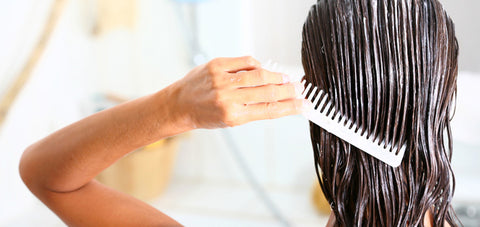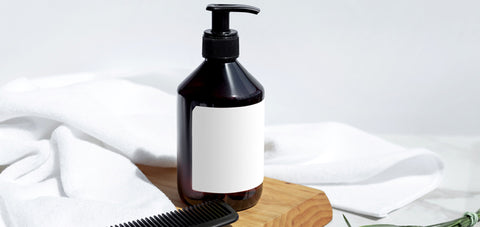
Hair conditioning is usually the second step in your hair washing routine and that's no news. However, this is also a step that most of us are guilty of skipping quite often. The hair cleanser or shampoo is designed to clean your hair from all the impurities, sweat, dead skin cells, etc. But a hair conditioner is responsible for making your hair softer and easier to manage while protecting the hair shafts from damage. When you only use shampoo on your hair, you will notice that your hair gets dull and dry as it dries. Hence, it’s necessary to follow it up with a conditioner. Conditioners contain fatty alcohols, humectants and oils that make your hair softer, flexible and easier to style. Some conditioners have protein to temporarily bind split ends and others have hair thickening agents that can make your hair feel fuller. While you might be aware of all these things related to a hair conditioner, you may not be getting the desired results because you’re probably using this product incorrectly. And we're here to correct you and acquaint you with how to use the conditioner, and answer all the potential questions you might have.
-
How to Apply Hair Conditioner?
-
How Long Should You Leave Your Conditioner on Hair?
-
How to Choose the Right Conditioner for Your Hair?
-
Types of Conditioner:
-
Pure Sense Hair Conditoners to try:
-
Conclusion
-
Frequently Asked Questions (FAQs)
What is a Conditioner and What Does it Do?
A hair conditioner is a mask-like product with a creamy consistency. One of the many uses of hair conditioner is to improve the texture of your hair. It basically hydrates and replenishes your hair to make it appear softer. A hair conditioner also helps reduce friction between your strands and makes it easier for you to brush through them once you're done with your hair wash. Hair conditioning is of utmost importance because it forms a layer along your hair shaft, making it easier for you to manage and style it. Your hair conditioner is also responsible for giving your hair the much-needed shine post a hair wash.
How to Apply Hair Conditioner?

Follow the below-mentioned steps to condition your hair well:
Step 1: Thoroughly rinse off all the shampoo, and wring out the excess water from your hair.
Step 2: Use the amount of conditioner recommended on the bottle, which is usually the size of a quarter.
Step 3: Spread it evenly on the ends of your hair. If you have longer hair, spread it from chin level and down. Avoid applying conditioner on your scalp.
Step 4: Run your fingers or a wide-toothed comb through the ends of your hair to work in the conditioner.
Step 5: Give it at least two to three minutes to do its job.
Step 6: Thoroughly rinse the conditioner off with cold water.
How Long Should You Leave Your Conditioner on Hair?
If you're using a rinse-off conditioner, you should leave it on your hair for about two to three minutes post shampooing. However, it's always better to read the instructions given on the bottle of the conditioner to get a better idea. This is because some conditioners are formulated to take longer to get completely absorbed into your hair than the rest.
Is Conditioning Necessary?
Your shampoo or hair cleanser will only clean your hair and scalp from all the impurities. It is the hair conditioner's job to make your hair frizz-free, moisturised, manageable and easy to style. It also protects your hair from breakage, thus making conditioning quite necessary. However, choosing the right conditioner for your hair type is crucial too. Your hair care products must suit your hair type to help strengthen it and improve the texture in the long run.
Is Over-Conditioning Your Hair Bad?
By now you already know that the conditioner forms a layer along your hair shaft, which adds shine to your hair and makes it manageable and easy to brush through. But over-conditioning your hair can be as bad as not conditioning at all. Over-conditioning can lead to build-up that can weaken the efficacy of other hair products. This happens because the layer of conditioner on your hair blocks other products like serums, oils, etc., from penetrating through your hair shaft.
If at all you notice the following signs, you should know that you are over-conditioning your hair:
- Hair sliding off from underpins each time you tie it up
- Difficult to manage and style
- Less volume and heavy hair
How to Reverse Over-Conditioned Hair?
You can start by using less conditioner for the first few washes. Another way is to rinse your hair with diluted apple cider vinegar solution (one part apple cider vinegar and two parts water) once a month. You can also use a clarifying shampoo to get rid of extra layers of conditioner. Don't use a conditioner till you lose all the extra layers.
How to Choose the Right Conditioner for Your Hair?
When you are on the lookout for a hair conditioner, you should take into account your hair type and styling routine. Hair with different textures will need different ingredients that can treat it well. If you're someone who blow-dries your hair daily or gets them coloured regularly, you will need some extra moisture.
-
Colour-Treated Hair:
If you have hair that is bleached, coloured or permed, you might have experienced extra wear and tear. Hence, you need to look for shampoo and conditioner that are meant for colour-treated hair. You can also ask at the salon for recommendations.
-
Textured Hair:
If you have thicker hair shafts than others, you will have to look for conditioners that are stronger in the formula to protect your hair.
-
Curly Hair:
If you are someone with curly hair, you know that your hair is more prone to dryness and frizz. This is why you will need a hair conditioner that is meant to provide extra hydration to curly hair. Make sure to spread the conditioner evenly over your head and run a wide-toothed comb through your hair after applying the conditioner.
Types of Conditioners:

There are three main types of conditioners that you should be aware of.
-
Rinse-Out Conditioners:
This one is the most common type of hair conditioner that people use regularly. Rinse-out conditioners are applied on damp hair after shampooing. The product is left on for a few minutes and then rinsed off thoroughly. A rinse-out conditioner will help you achieve manageable hair, which appears softer and more lustrous. It also protects your hair cuticles from damage caused by heat.
-
Deep Conditioners:
These are packed with hydrating properties that can be used on dry and damaged hair. Deep conditioners are made with essential oils, butters and other such moisturising ingredients that mainly help your hair repair damage and dryness. You are required to leave a deep conditioner on for about 30 minutes and then rinse it off thoroughly. This conditioner focuses on hydrating and repairing damaged hair. If you have normal or oily hair, it's better to avoid deep conditioners as they can make your hair greasier and add weight too.
-
Leave-in Conditioners:
This type of conditioner doesn't weigh too much and forms a protective layer on your hair. They are usually applied to your hair once you're done showering to help keep your hair soft. They are also useful for detangling your hair easily and make it easier for you to style it. Leave-in conditioners mainly work as moisturisers and protect your hair from other aggressors.
Pure Sense Hair Conditioners to Try:
Pure Sense is a skincare and hair care brand that has a couple of hair conditioners made with natural ingredients. They are free of chemicals like sulphates, parabens and carcinogens along with being cruelty-free and earth-friendly. Here are the products that you should try.
-
Rejuvenating Grapefruit Revitalising Hair Conditioner:
This grapefruit hair conditioner is enriched with grapefruit that softens your hair and adds shine to your tresses. As it is packed with hydrolysed rice protein, this hair conditioner has the ability to control frizz. What’s more, the fruity zesty fragrance of this hair conditioner will uplift your senses.

-
Macadamia Deep Nourishing Hair Conditioner:
This hair conditioner is made with macadamia nut oil that provides your hair with the much-needed hydration. The presence of rice protein in this product will repair damaged hair while coconut oil helps seal the split ends all too well. The sweet nutty fragrance of this hair conditioner is sure to soothe and calm your senses.
Conclusion:
Hair care is of utmost importance and so is using the hair care products the right way. Now that you know how to use conditioner, go ahead and make changes to your hair care routine and see how beautiful your mane starts to look over time. After all, all of us deserve to flaunt our soft, shiny, luscious hair!
Frequently Asked Questions (FAQs):
-
Can we use conditioner on the scalp?
No, you must avoid using conditioner on the scalp as it can make the roots oilier than they naturally are. The conditioner is meant to be used only on your hair as it needs the most hydration. So, make sure you condition your hair only from the mid until the ends of your hair.
-
When to apply hair conditioner?
You can use the hair conditioner immediately after shampooing. It is recommended to use a conditioner two to three times a week depending on how often your hair is washed in the week. If you are someone with thin and fine hair and are more prone to greasiness, it is better if you condition less often.
-
Is conditioner good for hair?
Yes, a conditioner's main purpose is to soften your hair and make it more manageable for you. It is formulated to hydrate your hair and add shine to your tresses. So, it makes for a decent product.







